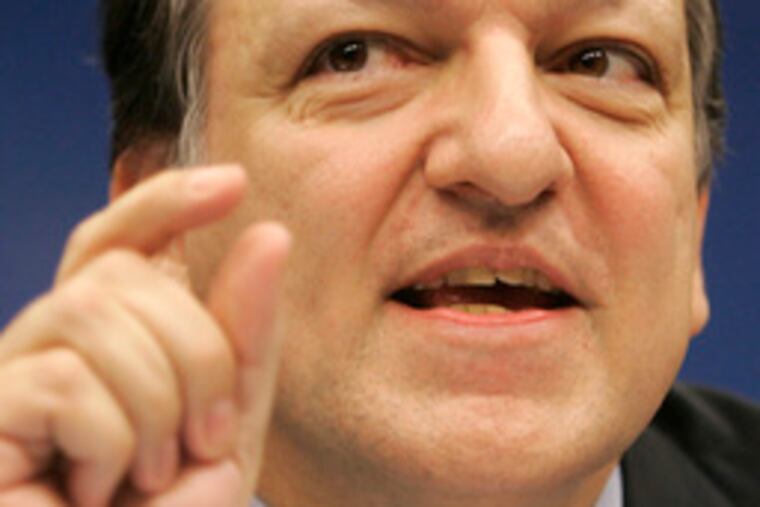European Union adopts climate pact, stimulus plan
BRUSSELS, Belgium - The leaders of Europe yesterday adopted what they described as a historic pact to combat global warming and challenged President-elect Barack Obama to join in their commitment to drastically reduce greenhouse gases despite the global economic crisis.

BRUSSELS, Belgium - The leaders of Europe yesterday adopted what they described as a historic pact to combat global warming and challenged President-elect Barack Obama to join in their commitment to drastically reduce greenhouse gases despite the global economic crisis.
The 27 European Union nations also endorsed a $260 billion economic-stimulus plan, equivalent to 1.5 percent of the bloc's gross domestic product, and urged the Obama administration to prepare similarly ambitious measures and financial reforms for coordinated action at a summit of the world's 20 major economic powers scheduled April 2 in London.
The appeals, at a two-day European Union summit in Brussels, reflected widespread expectations among European leaders that Obama and his team would be easier to work with than the Bush administration and that, to a large extent, the president-elect shared their assessment of the need for bold steps to slow global warming and revive economies that have been sapped by financial turmoil.
"Our message to our global partners is, 'Yes, you can,' " said Jose Manuel Barroso, president of the union's executive commission, echoing one of Obama's campaign slogans. "Especially to our American partners," he added.
The European leaders, particularly President Nicolas Sarkozy of France, who holds the union's rotating presidency, committed to reducing greenhouse-gas emissions 20 percent in Europe before 2020 - and 30 percent if other countries made comparable pledges at a U.N. environment conference scheduled next year in Copenhagen.
To reach their goals, the leaders pledged that 20 percent of their energy would come from renewable sources by 2020, leading to predictions of windmill farms across the European countryside and carpets of solar panels such as those that were recently installed atop the Vatican in Rome.
In a measure of the expenses the pledge seemed likely to entail, only about 8.5 percent of Europe's energy now comes from renewable sources, much of it from hydroelectric- or nuclear-power stations. Experts predicted that steps needed to reach the targets could raise electricity bills in Europe as much as 15 percent for industrial users and add nearly $200 to the average household's annual bill.
In complicated negotiations that led to yesterday's accord, Eastern European countries fought to get compensation for particularly drastic changes that would be necessary there if the goals were to be met. Poland, for instance, gets as much as 90 percent of its electricity from Soviet-era coal-fired generators, which are a major pollutant and, under the accord, will be forced to pay heavily for the carbon dioxide they spew into the air.
Polish and other high-pollution Eastern European industries will receive a disproportionate amount of subsidies to finance their part in a pay-to-pollute program. The Polish prime minister, Donald Tusk, told reporters that he was satisfied with the outcome despite previous reservations and what Sarkozy described as arduous negotiations. Tusk flashed a victory sign to television cameras as he got in a car at the close of the summit.
Italy's Prime Minister Silvio Berlusconi, who had threatened a veto to protect several high-pollution industries in his country, said he also backed off because he did not want to play the role of spoiler after it became clear a strong majority favored going ahead with the pact.
Similarly, Chancellor Angela Merkel of Germany declared the agreement a victory for Europe despite earlier fears that her country's giant economy would be called on to underpin the subsidies for Eastern Europe.